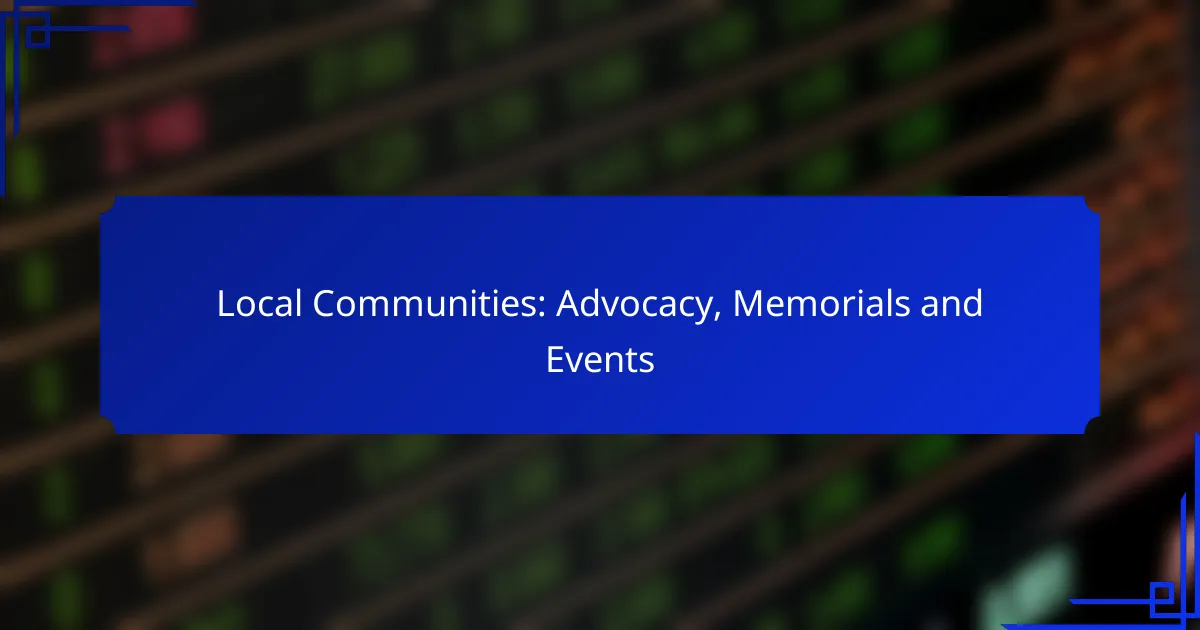Local communities play a vital role in advocating for change, fostering collective action through grassroots initiatives and partnerships with local government. They also organize memorial events to honor significant contributions and sacrifices, strengthening community bonds. Engaging in local events offers residents an opportunity to connect, volunteer, and enhance the vibrancy of their neighborhoods.
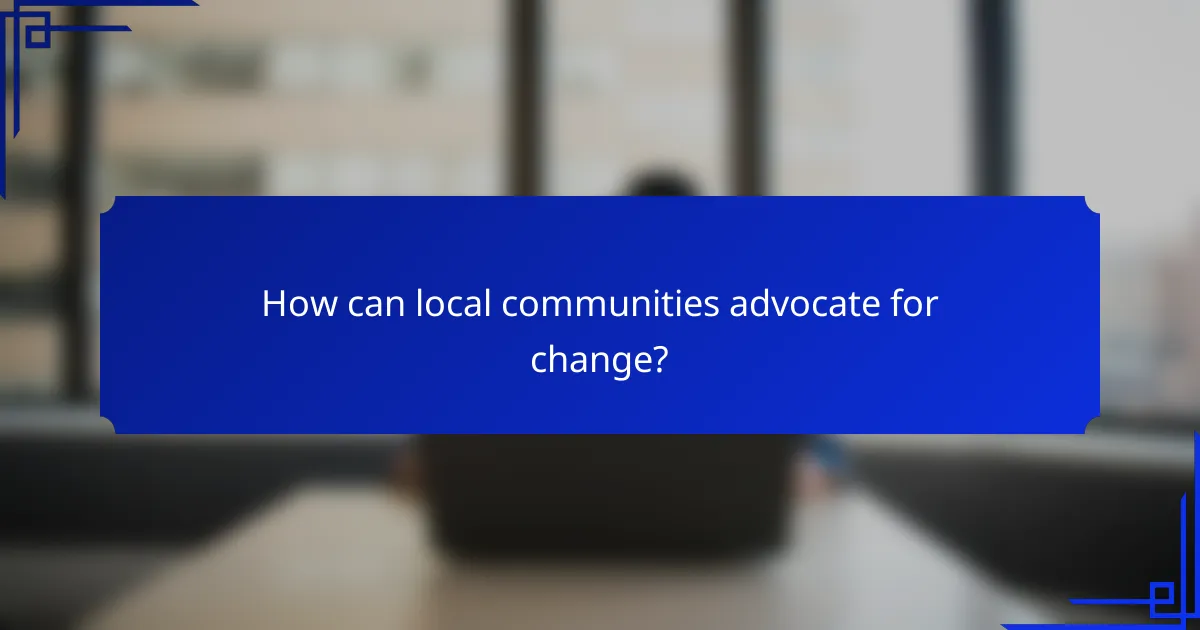
How can local communities advocate for change?
Local communities can advocate for change by organizing efforts that address specific issues, mobilizing residents, and collaborating with various stakeholders. Effective advocacy often involves a combination of grassroots initiatives, partnerships with local government, and community organizing to amplify voices and drive action.
Community organizing initiatives
Community organizing initiatives focus on mobilizing residents to address local issues collectively. These initiatives can take various forms, such as neighborhood meetings, workshops, and outreach programs that educate residents about specific challenges. For example, a community might organize a series of town halls to discuss environmental concerns, encouraging participation and input from diverse groups.
Successful organizing requires clear goals and strategies. Communities should identify key issues, build a coalition of supporters, and develop a plan for action. Engaging local leaders and influencers can enhance credibility and reach, making initiatives more impactful.
Partnerships with local government
Forming partnerships with local government is crucial for effective advocacy. These collaborations can help communities gain access to resources, funding, and policy support. For instance, a community group may work with city officials to address housing shortages, leading to the development of affordable housing projects.
To establish productive partnerships, communities should approach local government with well-researched proposals and a clear understanding of mutual benefits. Regular communication and transparency can foster trust and cooperation, ensuring that community needs are prioritized in local decision-making.
Grassroots campaigns
Grassroots campaigns empower individuals to advocate for change from the ground up. These campaigns often leverage social media, local events, and public demonstrations to raise awareness and mobilize support. For example, a grassroots campaign might focus on promoting public transportation improvements by gathering signatures for a petition and organizing community rallies.
Effective grassroots campaigns require strategic planning and community engagement. Organizers should identify target audiences, craft compelling messages, and utilize various channels to reach potential supporters. Building a strong network of volunteers can enhance the campaign’s reach and effectiveness, ensuring sustained momentum for the cause.
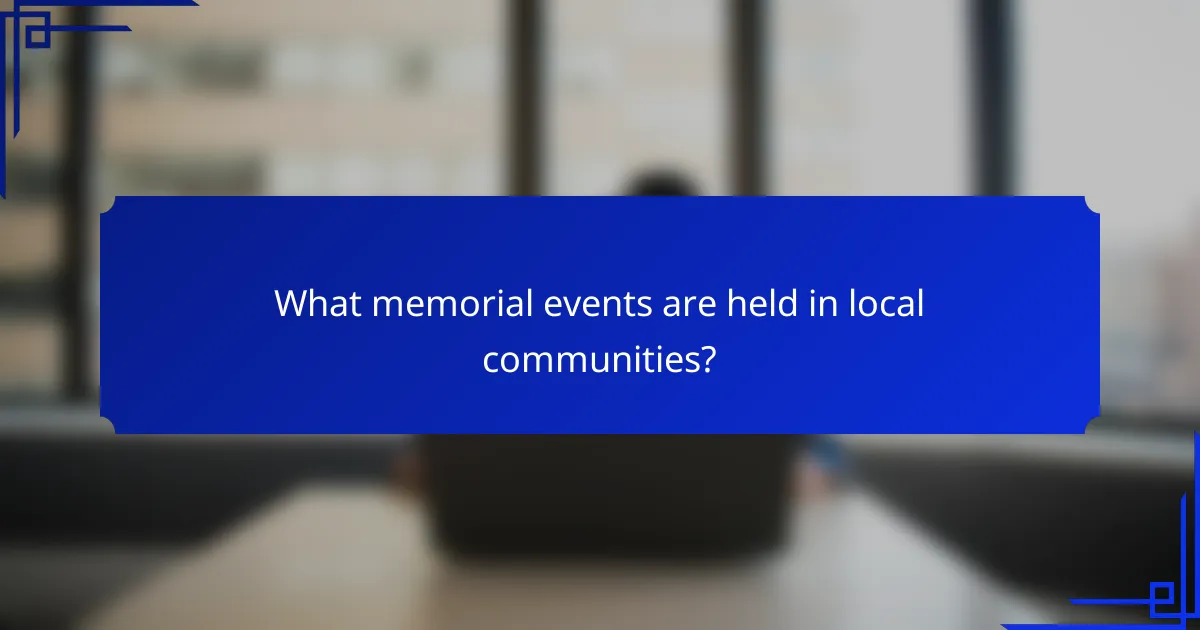
What memorial events are held in local communities?
Local communities often organize various memorial events to honor and remember individuals or groups who have made significant contributions or sacrifices. These events serve as a way to foster community spirit and collective remembrance.
Annual remembrance ceremonies
Annual remembrance ceremonies are typically held on specific dates that hold significance, such as anniversaries of tragic events or national holidays. These ceremonies often include speeches, moments of silence, and the laying of wreaths to pay tribute to those being honored.
Communities may gather in public spaces like parks or town squares, and participation can range from a few dozen to several hundred attendees, depending on the event’s scale. It’s essential to promote these events through local media and social platforms to encourage wider participation.
Memorial parades
Memorial parades are vibrant events that celebrate the lives of those being remembered, often featuring floats, music, and community groups. These parades can take place on significant dates and may include participants dressed in themed attire to reflect the spirit of the occasion.
Organizing a parade requires coordination with local authorities for permits and safety measures. Communities should consider involving local schools and organizations to enhance participation and foster a sense of unity.
Community art installations
Community art installations serve as a lasting tribute and can take various forms, including murals, sculptures, or interactive exhibits. These installations often involve local artists and can be placed in public areas to encourage ongoing reflection and engagement.
When planning an art installation, it’s crucial to involve community members in the design process to ensure it resonates with local sentiments. Fundraising efforts may be necessary to cover costs, and partnerships with local businesses can provide additional support.
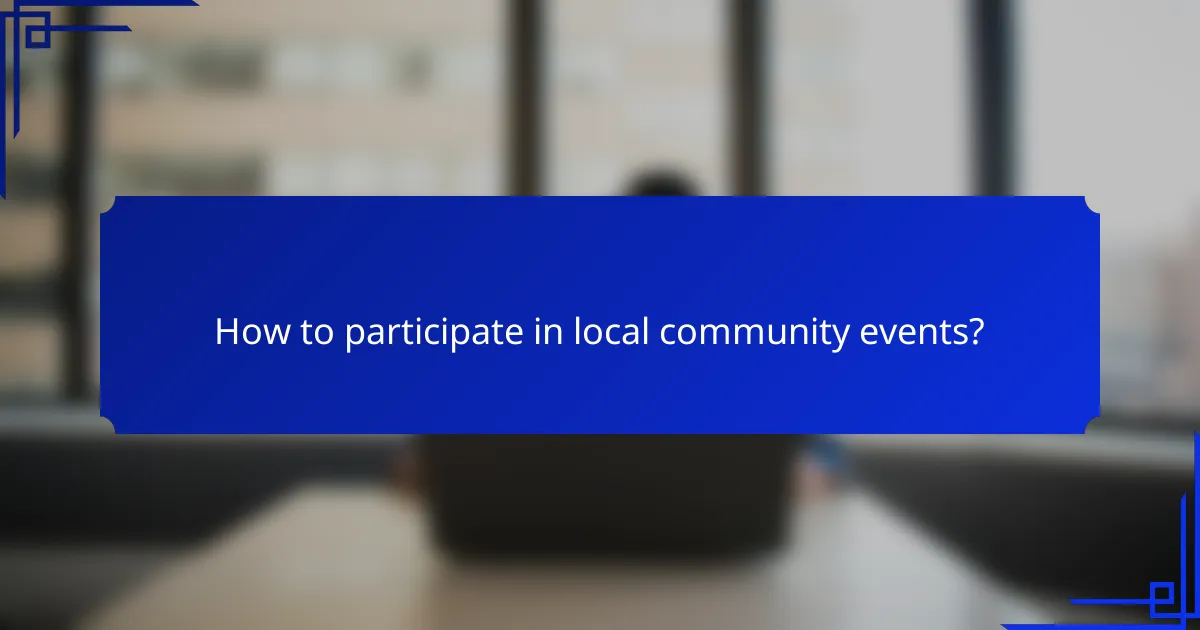
How to participate in local community events?
Participating in local community events is a straightforward way to engage with your neighborhood and contribute to its vibrancy. You can join through volunteering, registering for events, or staying informed about upcoming activities.
Volunteer opportunities
Many local events rely on volunteers to help with various tasks, from setup to cleanup. Check with community centers, non-profit organizations, or event-specific websites to find volunteer roles that match your interests and availability.
Common volunteer tasks include assisting with registration, guiding attendees, or providing logistical support. Engaging in these roles not only helps the event run smoothly but also allows you to meet new people and learn more about your community.
Event registration processes
Most local events require prior registration, which can often be done online or in person. Look for registration links on official event pages or community bulletin boards, where you can find details about fees, deadlines, and participant limits.
Be mindful of early registration discounts or special offers that may apply. Some events might have limited spots, so it’s advisable to register as soon as possible to secure your place.
Local event calendars
Local event calendars are essential resources for staying updated on community happenings. Many cities maintain online calendars that list events by date, type, or location, making it easy to find activities that interest you.
Check local government websites, community centers, or social media groups for these calendars. Subscribing to newsletters or following local organizations can also provide timely updates on upcoming events and opportunities to participate.
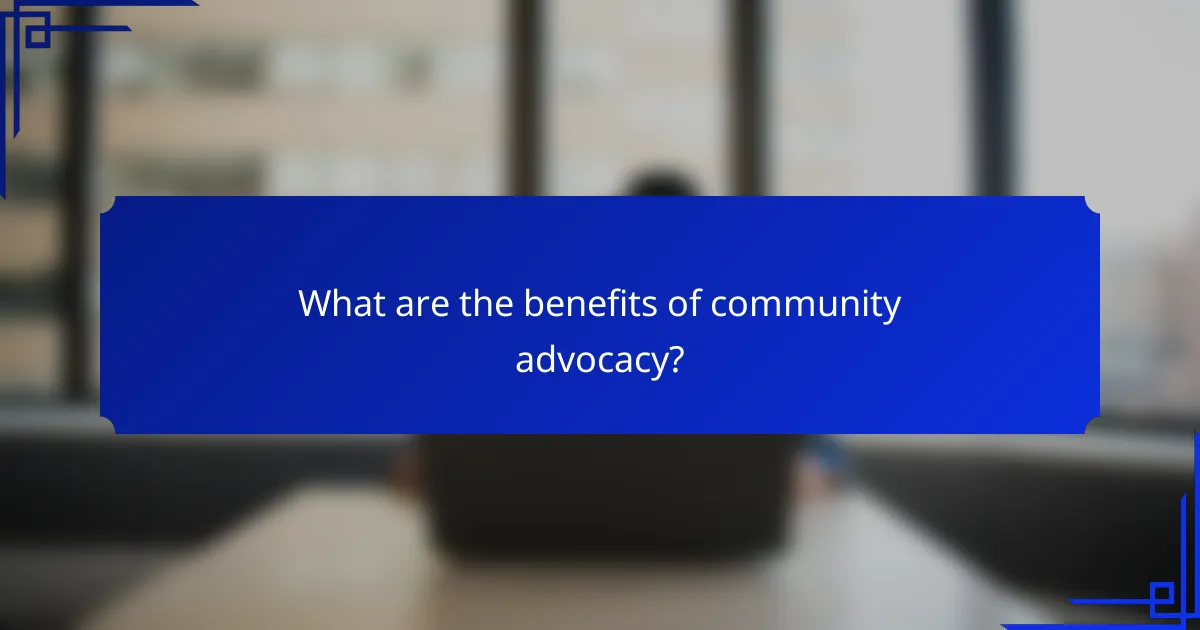
What are the benefits of community advocacy?
Community advocacy provides numerous advantages, including enhanced participation in local governance and improved quality of life. By engaging residents in advocacy efforts, communities can address their unique needs and foster a sense of ownership and responsibility.
Increased civic engagement
Increased civic engagement is a primary benefit of community advocacy. When residents actively participate in local issues, they become more informed about governance and civic responsibilities. This engagement can manifest in various forms, such as attending town hall meetings, joining local boards, or participating in community projects.
To foster civic engagement, communities can organize workshops or informational sessions that educate residents on local issues and advocacy techniques. Encouraging participation through social media campaigns or community events can also help increase awareness and involvement.
Stronger community bonds
Community advocacy strengthens bonds among residents by promoting collaboration and shared goals. When individuals work together on common issues, they build trust and relationships that enhance social cohesion. This sense of community can lead to a more supportive environment where residents feel connected and valued.
To cultivate these bonds, communities can host events such as neighborhood clean-ups or cultural festivals that encourage teamwork and interaction. Regular meetings or forums can also provide a platform for residents to share their experiences and ideas, further solidifying these connections.
Influence on local policies
Community advocacy significantly influences local policies by amplifying the voices of residents. When communities come together to advocate for specific changes, they can effectively communicate their needs to local government officials. This collective action can lead to the implementation of policies that better reflect the community’s interests.
To maximize impact, advocacy groups should focus on building relationships with local policymakers and presenting well-researched proposals. Engaging in campaigns that highlight the benefits of proposed changes can also sway public opinion and encourage policymakers to take action. Regularly tracking and reporting on the outcomes of advocacy efforts can further demonstrate effectiveness and sustain momentum for future initiatives.
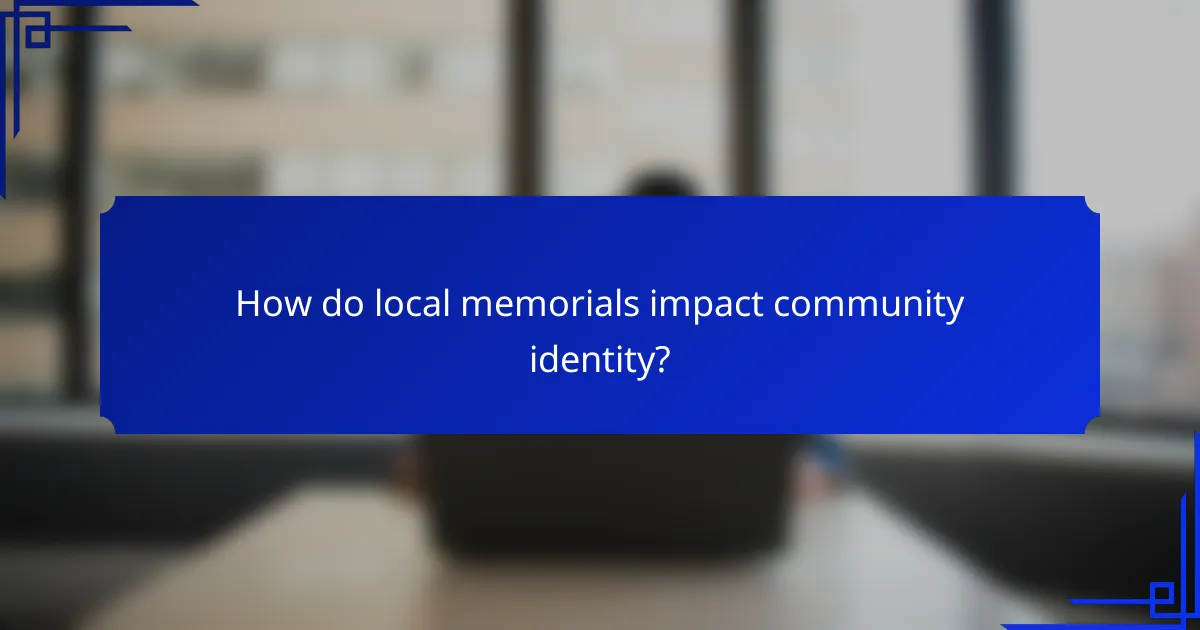
How do local memorials impact community identity?
Local memorials significantly shape community identity by serving as symbols of shared history and collective values. They foster a sense of belonging and continuity, connecting residents to their past while influencing their present and future.
Preservation of history
Memorials play a crucial role in preserving local history by commemorating significant events and individuals. They serve as tangible reminders of the community’s heritage, helping to educate current and future generations about their roots.
For example, a memorial dedicated to a historical event, such as a war or civil rights movement, can provide context and understanding of the community’s struggles and achievements. This preservation helps maintain a narrative that is vital for community cohesion.
Fostering collective memory
Collective memory is strengthened through local memorials, as they provide a shared space for reflection and remembrance. These sites encourage community members to come together, share stories, and honor those who have contributed to their identity.
Events held at memorials, such as anniversaries or commemorative gatherings, reinforce this collective memory. They create opportunities for dialogue and connection, allowing residents to bond over shared experiences and histories.
Enhancing community pride
Local memorials can enhance community pride by showcasing the unique aspects of a community’s identity. When residents take pride in their memorials, they often feel a stronger connection to their neighborhood and its history.
Communities may organize events or initiatives around their memorials, such as clean-up days or educational programs, which not only beautify the area but also foster a sense of ownership and responsibility among residents. This active engagement can lead to increased civic participation and a more vibrant community spirit.
